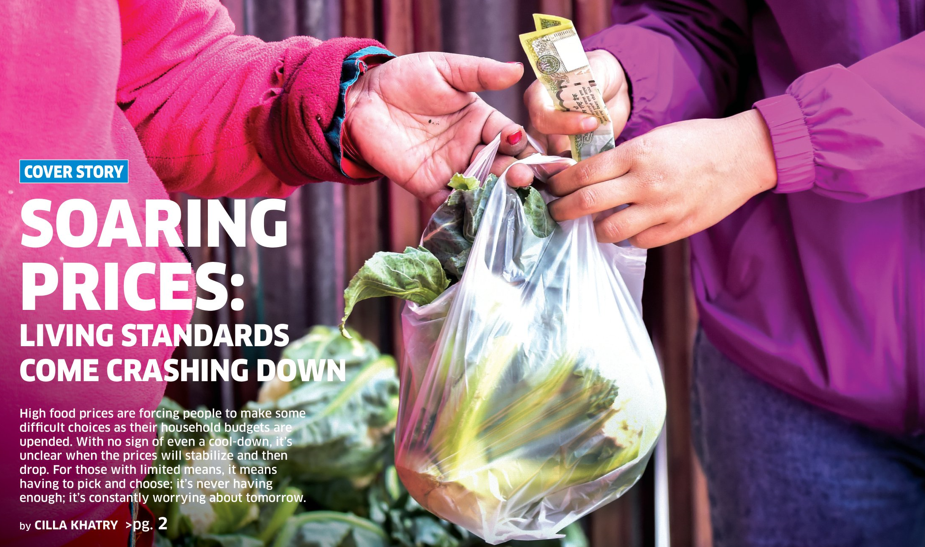ApEx spoke to 20 people at random. Everybody said they were worried by the rising fuel and food prices. Worse, the pricing of most things, they said, seems to be arbitrary. The government isn’t regulating the market properly, they complained. People felt like they weren’t getting their money’s worth.
As prices of essentials continue to surge, people are forced to either stretch their incomes by cutting down on expenses or look at ways to make extra money. A street vendor in Maitidevi, Kathmandu, said his family was only cooking only a meal a day to save on LPG gas, which is currently priced at Rs 1,800 a cylinder. A hospitality student in Kathmandu sold his motorcycle to pay rent and buy food. “I was spending a lot of money on petrol. Now, I walk to most places,” he says. Many people lost their jobs during the Covid-19 pandemic, and the economy was yet to recover when the conflict in Ukraine put a further damper on things. The disruption of the demand and supply chain meant inflation would only get worse. But as expected as that was, it has still been hard to cope. “My husband was made redundant during the Covid-19 lockdown and I’m the sole earning member of my family,” says Shobha Budathoki who works at Bajeko Sekuwa in Anamnagar, Kathmandu. Budathoki has two other part-time jobs besides her main one but it’s a struggle to pay all her bills. She has two sons enrolled at a government school. She worries about their future, about if she will be able to send them to good colleges. It isn’t just those from the lower economic strata who are feeling the pinch. With the official inflation rate now up to 7.68 percent—and the unofficial rate perhaps much higher—those with well-paying jobs fret about the rising prices too. Their household expenditure has gone up and, with no changes in their income, many are dipping into their savings. Anushka Pant, a 37-year-old banker ApEx met at Sanepa, Lalitpur, says she used to save a fixed amount every month. It was her emergency fund. But now she isn’t able to do that. All her salary goes to rent, utilities, and groceries. She is living paycheck to paycheck, sometimes even taking loans from her friends and colleagues. “This makes me feel extremely vulnerable. I’m not comfortable with my current financial situation,” she says. Her friends, Pant adds, are suffering too. There’s a nurse who hasn’t been paid in two months and she’s finding it difficult to cope. She is always stressed about money and how she can provide for her family as her parents depend on her. Another friend, who was living in Kathmandu by herself, has gone back to her hometown Biratnagar, after falling behind on rent. Nothing is cheap anymore, says Ram Kharel who has been running a hardware store in Lalitpur for six years. An egg costs Rs 18. The price of milk has shot up by Rs 20 a liter in just a couple of months. The price of sunflower oil is Rs 240 a liter while ghee now costs Rs 900 a kg. “At this rate, it’s getting increasingly difficult to feed my family,” says Kharel. Unlike in developed countries, Nepal lacks proper health care and education policies. There is no welfare system where the state takes care of some of your expenses. This means people need to plan and save for emergencies. Most people ApEx spoke to seemed to be preoccupied with ‘what ifs’: What if someone in their family falls ill? Will they be able to provide the necessary treatment? What if they can’t send their children to good schools and colleges? Will they lose out on the chance to live a good life? Shambhu Rai, an electrician who lives in Bhaktapur, says as prices escalate, he finds himself working round-the-clock. His day starts as early as six in the morning and ends as late as midnight. If he doesn’t take up as many jobs as possible, he says his family will have to compromise on something or the other. “Either my wife will have to take up odd jobs or we will have to skip meals,” says Rai who wants his six-year-old daughter and 11-year-old son to continue studying at the English boarding school they attend. He’s not compromising on their education, he says. “It’s their only shot at a decent life. My wife and I never got that chance and we want to make sure our children aren’t similarly deprived,” he says. High food prices are forcing people to make some difficult choices as their household budgets are upended. With no sign of even a cool-down, it’s unclear when the prices will stabilize and then drop. For those with limited means, it means having to pick and choose; it’s never having enough; it’s constantly worrying about tomorrow. “This makes for an unhinging experience,” says Kumari.











